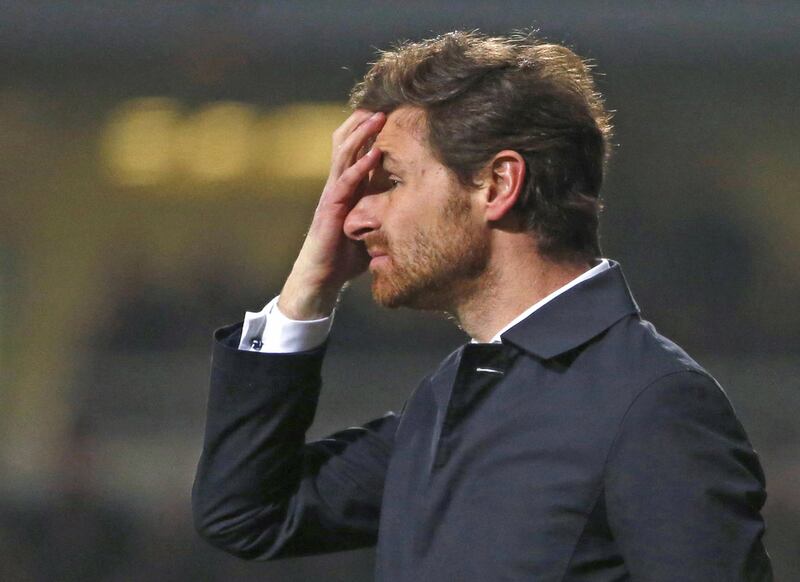Andre Villas-Boas was dismissed as manager of Tottenham Hotspur on Monday morning, the announcement coming at 3pm UAE time, just as the draw for the Champions League was about to begin.
The timing may have been coincidental, but the symbolism was potent: thanks to their stutter towards the end of last season, Tottenham were in the Europa League draw, which came later and, given how things have been going recently, there seemed little chance of them being in the Champions League hat next season.
After Spurs lost 6-0 at Manchester City on November 24, there were reports that he was very close to dismissal and after Sunday’s 5-0 home defeat to Liverpool, he seemed to acknowledge that the end might be nigh, conceding that whether he kept his job was “the one thing I can’t control”.
There are, essentially, two ways of looking at Villas-Boas’s dismissal.
On the one hand, he took over a team in transition, having lost Luka Modric and Rafael van der Vaart, and took them to fifth last season, only to lose his best player and then be given seven new players to accommodate.
Given the difficulty of making sure they all settle and working out how best to deploy them, it was inevitable that there would be some teething problems and in that regard the decision to oust Villas-Boas seems incredibly harsh.
He does, after all, still have the highest win-percentage of any of Tottenham’s in the last century and Spurs are only eight points off the top of the table.
On the other hand, while a certain lack of fluency is understandable, even forgivable, there was a haplessness and a lack of fight in those two “expressive” defeats – to use Villas-Boas’s term – that must have been deeply worrying.
The thrust of a hanging foot into the chest of Luis Suarez that saw Paulinho sent off seemed symptomatic of the pervasive sense of frustration around the club.
It was an open secret in his time at Chelsea that the spikiness Villas-Boas has demonstrated at times in news conferences had undermined relationships with players and, while he seemed to have made an effort at Spurs to create bonds, texting players jokes and asking about their personal lives, it is not clear that he was ever popular.
The arrival of seven new players, similarly, must have had an impact on morale, at least in the short term.
Still, plenty have managers have been successful in the past without being liked and the key relationship here seems to have been that between Villas-Boas and Franco Baldini, his director of football.
Rumours of friction have been rife since the summer – despite the two apparently quoting Shakespeare at each other over dinner when Baldini considered appointing head coach at Roma – and Villas-Boas’s reluctance after the defeat to Liverpool to say he had faith in his players seemed significant.
It was Baldini who sanctioned the sale of Bale and Baldini who made the seven signings, but it is Villas-Boas who has paid the price for failing to gel those players into a cohesive unit.
Who can fill the void left by Andre Villas-Boas?
Fabio Capello
The veteran Italian was at White Hart Lane on Sunday and his right-hand man Franco Baldini is the club’s technical director. Capello is currently the coach of Russia and has a World Cup ahead, but may fancy a shot at the Premier League.
Franco Baldini
Baldini has plenty of top-level experience, albeit not as a manager. He has served the likes of Real Madrid and England with Capello, and has signed several members of the Tottenham squad. If the director football wants to be a manager, this may be his chance.
Michael Laudrup
The Dane is valued because of the job he has done at Swansea, continuing the good work of previous managers and winning the League Cup last season. Has a reputation for playing attractive football.
Guus Hiddink
The Dutchman is a seasoned trouble-shooter and is out of work after a well-travelled and often successful career, although he will start a second spell with Netherlands after the World Cup, so would be a short-term fix. Has managed in the Premier League before, with Chelsea.
Tim Sherwood
A former Spurs midfielder, Sherwood would be surprise full-time choice as he has no managerial experience. However, he works for the club in a technical role and has been put in temporary charge of the team.
Roberto Di Matteo
Has experience picking up the pieces of a Villas-Boas job, having replaced him at Chelsea and going on to win the Champions League. Fired by Chelsea a year ago but if Spurs want him they may have to move fast; he is being linked with a move to old club West Brom.
sports@thenational.ae
Follow us on twitter at @SprtNationalUAE





